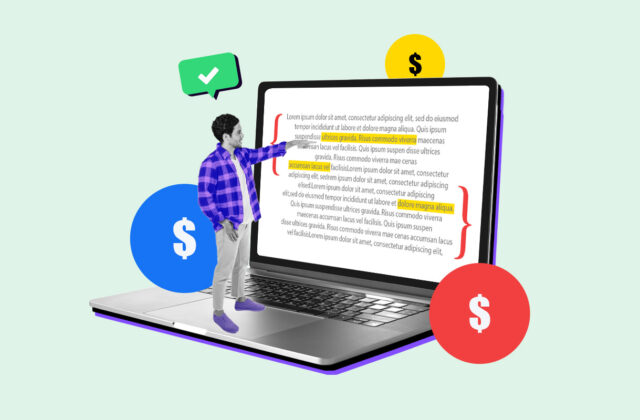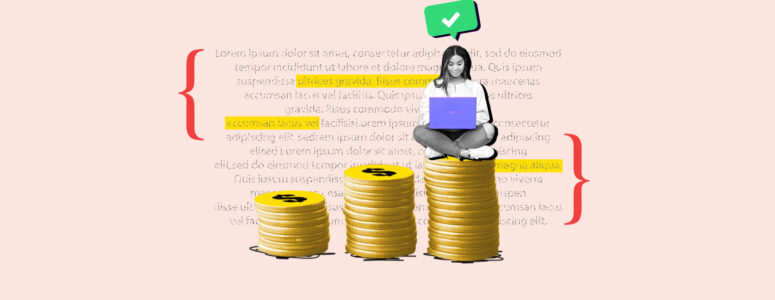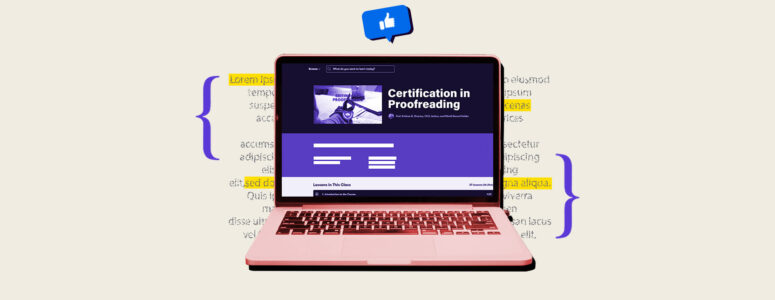If you’re thinking about becoming a proofreader, you’re probably wondering how good the pay will be. Read on to find out what you can earn (either as a freelance proofreader or at a traditional job) and what factors will affect your earnings.
01. Typical proofreading rates and salaries
In general, proofreaders make between $20–$40 per hour, which translates to around $40,000–$50,000 per year (assuming a full-time schedule).
The table below shows the average hourly rate and yearly salary that the US Bureau of Labor Statistics gives for proofreaders and how these figures compare to the ones given by several popular job boards and salary aggregators.
Average Proofreader Rates and Salaries
| Source | Hourly rate | Salary (per year) |
|---|---|---|
| Bureau of Labor Statistics | $25.35 | $52,520 |
| ZipRecruiter | $28 | $49,916 |
| Glassdoor | N/A | $63,000 |
| Indeed | $23.50 | $55,706 |
| Payscale | $20.51 | $51.296 |
| Salary.com | $30 | $63,416 |
Freelancing vs. full-time proofreading
The websites listed above don’t distinguish between freelance and full-time rates. In general, freelance proofreaders earn more per hour than traditionally employed proofreaders (i.e., they charge rates on the higher end of the $20–$40 range).
This doesn’t necessarily mean that freelancers earn more money overall, as they have to do a lot of unpaid extra work that their employer would normally take care of, which cuts into the time they can actually spend earning. We’ll break down freelance proofreading rates in more detail below.
Freelance rates recommended by editorial organizations
The rates that freelancers charge can vary widely. We spoke to Kenneth Kilpatrick, the president of a PR agency that hires freelance proofreaders, who told us, “When it comes to rates, I’ve seen proofreaders charge as low as $15 per hour and others more than $100 per hour.”
This can make it hard to figure out what rate you should charge, especially if you’re just starting out. Fortunately, there are several associations for freelance editors and proofreaders that suggest base rates that you can look to for guidance.
The Editorial Freelancers Association (EFA)
The proofreading rates suggested by the Editorial Freelancers Association are as follows:
| Median hourly rate | Median rate per word | Median pace of work (pages/hr) | |
|---|---|---|---|
| Proofreading, fiction | $35–$45 | $0.012–$0.02 | 8–14 |
| Proofreading, nonfiction | $40–$50 | $0.02–$0.03 | 7–11 |
| Proofreading, business/sales | $45–$57.50 | $0.02–$0.04 | 7–10 |
| Proofreading, medical/STEM | $45–$60 | $0.05–$0.05 | 6–10 |
Chartered Institute of Editors and Proofreaders (CIEP)
The Chartered Institute of Editors and Proofreaders (CIEP) is a UK-based organization for proofreaders and editors. The proofreading rate suggested by the CIEP is £30.75 per hour, equivalent to about $41 per hour (reported August 2025).
Association of Freelance Editors, Proofreaders, and Indexers of Ireland (AFEPI)
The AFEPI is a professional organization for editorial freelancers in Ireland. As of August 2025, the minimum proofreading rate recommended by the AFEPI is €34 per hour (which is equivalent to around $39 per hour).
Freelance proofreading rates: takeaways
There’s no one universal rate for freelance proofreading (and as you’ll see, rates are affected by many factors), but in general, as a beginner, you should probably charge around $20 per hour and raise your rates as you become more experienced (or if you start handling more specialized texts).
This matches what we were told by people with experience in the proofreading industry. One former proofreader named Tina Fey (no, not that Tina Fey) told us that “From my experience, a general range for new proofreaders on Upwork could be anywhere from $20 to $30 per hour, or $.01 to $.02 per word.”
If you set your rates any lower than $20 per hour, you’re charging a below-market rate. You should only consider this if you’re very new to the industry—and if you can, avoid doing it even then.

02. Should I charge per hour, per word, or per project?
It isn’t enough to decide what rates to charge—you also need to decide what kind of pricing structure you’re going to use. You have several options:
Charging per word or per project
If you’re a fast worker, then charging a fixed price per word or per project will give you the opportunity to earn more money. It also means that you and your clients will both know exactly how much the job will cost in advance, so it’s less likely you’ll have a dispute over the price later.
However, charging this way also has disadvantages. The biggest is that you could end up earning a low hourly rate for work that takes more time than you expected. This can easily happen if you encounter a common problem called scope creep.
Scope creep is when a client keeps increasing the scope of the work you’ve agreed to do. For example, they might make significant changes and then ask for extra rounds of edits free of charge. Needless to say, if you agree (which you might feel pressured to do to keep them as a client), this will put you behind and affect your overall earnings.
Charging per hour
Charging per hour will prevent this issue, and many freelancers prefer it for this reason.
The downside is that not all clients like paying per hour, as it’s harder for them to know exactly how much a job will cost. Businesses especially dislike it, as they need to set budgets for their projects.
Still, this pricing structure is common enough that many clients will still accept it.

03. Factors that determine how much you earn as a freelance proofreader
The rate you can charge is affected by the project you’re working on, your client’s budget, and your own skill level and experience.
Project factors
Your rate will usually be affected by your project’s:
- Length: Needless to say, larger projects pay more than smaller ones. Proofreading an entire book will pay more than proofreading a single article.
- Complexity: Proofing more complicated texts (e.g., that include a lot of jargon or many footnotes) also warrants a higher rate, as does anything that requires technical expertise. This is a factor for full-time proofreaders as well as freelancers; the nature of the texts that your company handles will affect your pay.
- Scope: Your pay will also depend on the types of changes you’re expected to make. Sometimes you’ll just have to do the bare minimum and fix clear spelling/grammar mistakes. Other times, you might have to make more extensive changes, like enforcing style guidelines.
- Writing quality: Editors and proofreaders often ask to review a sample of the text they’ll be working on before they offer a quote. This is because something that’s badly written will take longer to edit. If a piece is in bad shape, you should usually charge more for it.
Other important factors
The rate you can charge also depends on:
- Your experience: As you’d expect, you’ll be able to charge higher rates if you’ve accumulated more experience in the proofreading industry.
- Your client: Your client’s budget is an important factor. If you’re working with publishing houses or project management agencies, they’ll usually pay reasonably well. However, many proofreading newbies start out on freelancing sites like Upwork and Fiverr, and many of the clients on these sites have smaller budgets.
- The current market: When there’s a high demand for proofreaders, the pay improves. This also applies to subcategories within the industry. For example, there’s always a lot of demand for scientific and technical editors and proofreaders, so these types of proofreading are paid well.
- Cost of living: In general, a higher cost of living translates to higher wages, which means proofreaders can earn more working in an expensive area like New York City or San Francisco than in smaller cities. This is mainly applicable to traditional proofreading jobs rather than online freelancing.
We spoke to proofreader and editor Josh David, who has five years of experience working in the field. His advice was to “Study the market pricing for proofreading services and establish a competitive rate that takes your qualifications and expertise into account.” You’ll need to factor in all of the considerations above to come up with a rate that’s fair for everyone involved.
Hidden costs of freelancing to factor into your rates
When you’re setting rates for freelance proofreading services, you have to factor in costs that would usually be covered by an employer. These include:
- Holiday pay
- Sick pay
- Pension/retirement funding
- Healthcare
- Office equipment and supplies
- Software and subscriptions
- Other business expenses
Freelancers also have additional tasks to deal with that would usually be handled by an employer. For example, you’ll have to deal with:
- Filing taxes
- Marketing yourself
- Networking
- Continuing your professional development
- General admin work
You won’t be paid for any of that, which is another reason why your rates should be higher for freelance work than as a salaried employee. It’s common for freelancers to add 25%–100% or even more onto their base rate (the lowest hourly rate they’ll work for) to calculate the final rate they charge their clients.
04. How to make more money proofreading
If you’ve been proofreading for a while and you’ve got a solid amount of experience under your belt, you can look for ways to increase your income. Here are some tips to help you earn more from proofreading.
Avoid freelancer platforms
Although freelancer websites like Upwork and Fiverr are a good way to gain experience, they aren’t the best way to find gigs in the long term. As mentioned, they often attract clients with lower budgets. Moreover, they take a cut of your profits as a commission (often around 5%–20%).
Once you’ve accumulated some experience, it’s better to get off those platforms and work with clients directly.
Choose a more lucrative niche
The proofreading rates listed by the EFA show that specialized proofreading (such as medical, scientific, and business proofreading) commands higher rates than general proofreading. This is because it requires a greater level of expertise.
Ruth E. Thaler-Carter, an EFA member with decades of experience proofreading for a variety of publication types, commented that “Clients like law firms will pay more than most publications.”
If you have a background in STEM, law, finance, or business, you can leverage your experience to find specialized proofreading work that pays higher rates. (If you don’t have a background like this, you can develop one over time by taking on relevant proofreading work for lower rates—or by starting a separate side hustle in that area.)
Get a retainer agreement
A retainer agreement is an arrangement where a client guarantees that you’ll be paid a predetermined rate for a predetermined number of hours or projects each month. Even if the client doesn’t end up giving you any work, they’ll still have to pay you.
In return, you promise to be available to work for the amount of time the client has requested, for as long as the retainer contract lasts.
A retainer agreement means you don’t have to worry about where your next paycheck is coming from, as you’re guaranteed a stable wage (at least so long as the agreement lasts). Clients often won’t offer this kind of deal unless you suggest it, so you may have to take the initiative and pitch the idea to them yourself.
Increase your rates
If you end up working with your clients for a while, it’s normal to increase your rates every so often to keep up with the cost of living in your area (e.g., inflation and rising housing prices) and to reflect your growing expertise. This might seem obvious, but not everyone does it.
It’s also a good idea to negotiate your rates with a potential client if they make an offer that’s too low. Don’t sell yourself short by always accepting the first offer you get.
05. Is it easy to find work as a proofreader?

Getting your start in any industry can be challenging, so don’t bank on lucrative jobs falling into your lap when you’re just starting out. That said, there’s always a demand for proofreading.
More and more blogs and online businesses are springing up and there’s ever more web content that needs to be edited. Even with the recent advances in AI content generation, there’s still a need for proofreaders—usually, companies want at least one pair of eyes on their content before they put it online.
There’s also a growing number of independent authors looking to self-publish, many of whom are seeking freelancers to edit and proofread their work.
How do proofreaders get clients?
There are dozens of platforms that you can use to get paid to proofread, like Upwork, Fiverr, Scribbr, and ProofreadingPal. Create an account on any that seem promising and start looking for jobs.
It’s also a good idea to network. You can do this by joining editorial organizations and by attending in-person networking events. Someone might recommend you to a friend or point you in the direction of someone who’s looking for proofreaders. Don’t forget to print out business cards with your contact info on them ahead of time.
Your online presence is important, too. These days, it’s very cheap and easy to build a website by using platforms like Wix or WordPress. Upload a resume or a portfolio of your past work to your personal site.








Leave a Reply
You must be logged in to post a comment.